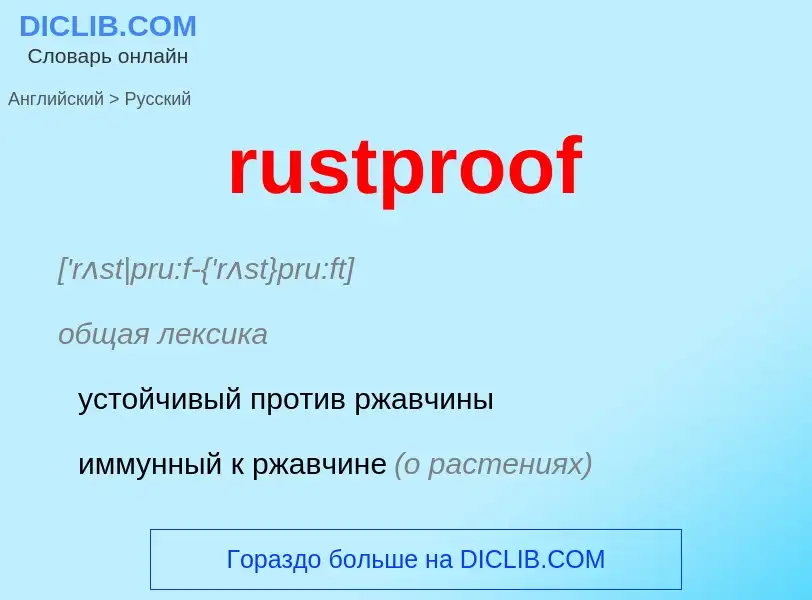Traduzione e analisi delle parole tramite l'intelligenza artificiale ChatGPT
In questa pagina puoi ottenere un'analisi dettagliata di una parola o frase, prodotta utilizzando la migliore tecnologia di intelligenza artificiale fino ad oggi:
- come viene usata la parola
- frequenza di utilizzo
- è usato più spesso nel discorso orale o scritto
- opzioni di traduzione delle parole
- esempi di utilizzo (varie frasi con traduzione)
- etimologia
rustproof - traduzione in russo
['rʌst|pru:f-{'rʌst}pru:ft]
общая лексика
устойчивый против ржавчины
иммунный к ржавчине (о растениях)
нержавеющий
нефтегазовая промышленность
защищать антикоррозионным материалом
нержавеющий, коррозионностойкий
синоним
прилагательное
общая лексика
нержавеющий
коррозионно-устойчивый
коррозиестойкий
['rʌst|pru:f-{'rʌst}pru:ft]
прилагательное
общая лексика
нержавеющий
коррозионно-устойчивый
коррозиестойкий
Definizione
Wikipedia

Stainless steel is an alloy of iron that is resistant to rusting and corrosion. It contains at least 11% chromium and may contain elements such as carbon, other nonmetals and metals to obtain other desired properties. Stainless steel's resistance to corrosion results from the chromium, which forms a passive film that can protect the material and self-heal in the presence of oxygen.: 3
The alloy's properties, such as luster and resistance to corrosion, are useful in many applications. Stainless steel can be rolled into sheets, plates, bars, wire, and tubing. These can be used in cookware, cutlery, surgical instruments, major appliances, vehicles, construction material in large buildings, industrial equipment (e.g., in paper mills, chemical plants, water treatment), and storage tanks and tankers for chemicals and food products.
The biological cleanability of stainless steel is superior to both aluminium and copper, and comparable to glass. Its cleanability, strength, and corrosion resistance have prompted the use of stainless steel in pharmaceutical and food processing plants.
Different types of stainless steel are labeled with an AISI three-digit number. The ISO 15510 standard lists the chemical compositions of stainless steels of the specifications in existing ISO, ASTM, EN, JIS, and GB standards in a useful interchange table.



![Stainless steel (bottom row) resists [[salt-water]] [[corrosion]] better than [[aluminium-bronze]] (top row) or [[copper-nickel]] alloys (middle row) Stainless steel (bottom row) resists [[salt-water]] [[corrosion]] better than [[aluminium-bronze]] (top row) or [[copper-nickel]] alloys (middle row)](https://commons.wikimedia.org/wiki/Special:FilePath/Corrosion of alloys in NaCl.jpg?width=200)
![Stainless steel is not completely immune to corrosion as shown in this [[desalination]] equipment. Stainless steel is not completely immune to corrosion as shown in this [[desalination]] equipment.](https://commons.wikimedia.org/wiki/Special:FilePath/Crevice corrosion of 316 SS tube and tube sheet in a desalination plant.png?width=200)
![Brown Firth Research Laboratory]] in [[Sheffield]], England Brown Firth Research Laboratory]] in [[Sheffield]], England](https://commons.wikimedia.org/wiki/Special:FilePath/Harry Brearley.jpg?width=200)
 002.jpg?width=200)
![nut]] on the left is not stainless steel and is [[rust]]y, unlike the nut on the right. nut]] on the left is not stainless steel and is [[rust]]y, unlike the nut on the right.](https://commons.wikimedia.org/wiki/Special:FilePath/P4150144 cable tyrolienne inox.jpg?width=200)
